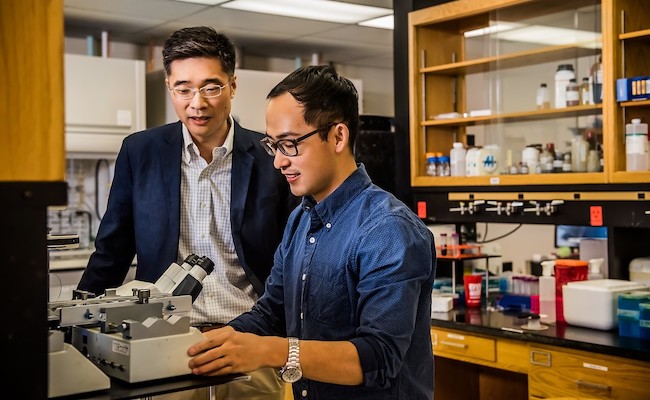
“…I enjoy the moments in research when myself and the students finally got something right after a long series of failures.” – Dr. Leidong Mao
We applaud Dr. Leidong Mao for being elected into the National Academy of Inventors this past month. “National Academy of Inventors Senior Members are faculty, scientists and administrators selected for their proven ability to invent and innovate.” Dr. Mao’s research has contributed to the development of diagnostic and therapeutic devices that have been patented for biomedical use, and he was awarded a National Science Foundation CAREER Award for his significant contributions to science and medicine. Dr. Mao and collaborators have been able to discover low-cost techniques for cancer diagnostics and oncology research including measuring magnetic properties using ferrofluids (liquid magnets) and micofluidics. Dr. Mao is a true leader in discovery, and his inventions have proven to serve advancements for the medical community.
Name: Leidong Mao
Hometown: Jiangsu, China
What did you study in college and where did you earn your degrees?: Fudan University in Shanghai China for my BS degree, Yale University in Connecticut USA for my PhD degree.
What brought you to UGA? UGA was my first and only job after getting my PhD degree. I was quite impressed by the small but promising engineering program in the liberal arts environment at that time. People who interviewed me at that time were also very kind and friendly.
What are your research interests and what motivated you to pursue this area of study? My research interests were shaped by my previous trainings and over the years my collaborations at UGA. Currently I am quite intrigued by the complexity of biology and want to use engineering approaches, especially microfluidics, to look deeper into a few biological questions.
What current or new research projects do you currently have happening in your lab? The research projects we are currently working on include using single cell measurement to investigate how biological clocks synchronize on the cellular level, and developing high throughput and high precision methods to isolate diagnostic and therapeutic cells.
How long have you been an instructor in engineering and what inspires you to teach or do research in your field? I have been teaching in the Computer System Engineering program for the last 15 years. Teaching and research are quite integrated. I encourage the students in my class to explore opportunities to pursue advanced degrees after graduation. Discussion of cutting-edge research in the classroom setting can sometimes motivate them to consider that route.
What research accomplishment are you most proud of and why? There is no specific accomplishment that I am most proud. But I enjoy the moments in research when myself and the students finally got something right after a long series of failures.
What skills do you think are most important for students to succeed in engineering and what methods do you use to ensure the students you engage with learn the skills they need? In my opinion, the most important thing is one’s interest. In the ideal scenario, if one is intrigued by a specific project, she or he will very likely be motivated to study it at depth. The mentor’s responsibilities are then to provide resource, support and guidance along the way.
What is one of your favorite places in Athens? Athens is a beautiful town – The Botanical Garden is one of my favorite places.
Read more about Dr. Mao’s research on his Research Page: http://magnet.engr.uga.edu/


